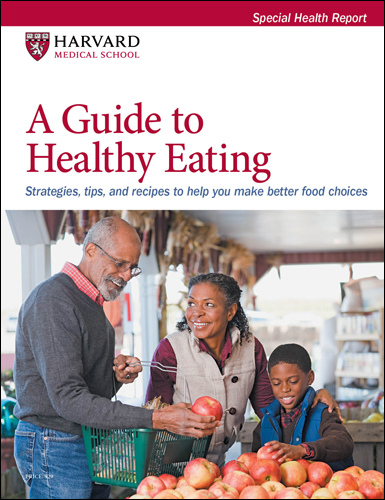Easy ways to keep inflammation in check
Incorporating lots of healthy habits into your day may help ward off chronic inflammation and keep you healthier.
- Reviewed by Anthony L. Komaroff, MD, Editor in Chief, Harvard Health Letter; Editorial Advisory Board Member, Harvard Health Publishing

A mattress, a toothbrush, and a salmon dinner: on the surface, those items don't seem to have much in common. But they all represent healthy lifestyle habits that help fight chronic inflammation, a persistent state of the immune system that's linked to many health problems. And the more healthy habits you practice, even simple ones, the better chance you'll have at thwarting chronic inflammation and disease.
What is inflammation?
Normally, inflammation is part of how the body responds to threats such as injury or invading microbes. The body sends special cells to attack and isolate invaders, clean up debris, and heal tissue and organs. It's an important system that kicks into high gear when we need it, and returns to normal when health is restored.
But sometimes the immune response continues indefinitely, fueled by unhealthy lifestyle habits. A constantly active immune system does more harm than good. It damages tissues and organs, and increases the risks for asthma, rheumatoid arthritis, inflammatory bowel disease, diabetes, heart disease, dementia, weight gain, heart attacks, and strokes.
Fighting back
Fortunately, for reasons we don't fully understand, certain healthy habits can counter chronic inflammation. A healthy diet, exercising regularly, getting enough sleep, maintaining good oral health, and reducing stress all reduce inflammation.
If those strategies seem too big to take on all at once, just start with small steps in their direction, such as the following.
Eat fatty fish twice a week. Here's that salmon dinner we mentioned earlier. Salmon and other fatty fish (such as anchovies, halibut, sardines, and tuna) contain omega-3 fatty acids that reduce inflammation. "Omega-3s disrupt the production of chemicals that cause inflammation by certain immune system cells. They may even help lower the risks for stroke and for the type of brain inflammation associated with Alzheimer's disease," says Dr. Robert Shmerling, a rheumatologist and medical editor of the Harvard Special Health Report Fighting Inflammation (/ui). "But our body doesn't make omega-3s. We need to get them from food." Other ways to fight inflammation with diet include minimizing processed foods and added sugars, and eating lots of fruits and vegetables, legumes, whole grains, poultry, fish, and healthy oils (such as olive and canola).
Get a new mattress. Does your mattress make you toss and turn? "Even one night of disturbed sleep can spark inflammation," Dr. Shmerling says. "It increases inflammatory substances in the blood. Regularly missing sleep contributes to obesity, which is also linked to inflammation." If you suspect that the fix for your poor sleep is a new mattress (or maybe just a mattress topper), it's worth the investment. Getting seven to nine hours of sleep per night is associated with reduced risks for many chronic diseases, including dementia.
Brush your teeth regularly. We're all supposed to brush our teeth twice per day, and floss them at least once per day. It's necessary to brush away the bacteria that can inflame the gums, lead to infection, and cause inflammation or infection elsewhere in the body. "Evidence suggests bacteria can travel to the heart, lungs, and even the brain. Inflammation in the gums also is strongly associated with diabetes," says Dr. Tien Jiang, a prosthodontist in the Department of Oral Health Policy and Epidemiology at the Harvard School of Dental Medicine.
Go for a walk. Aerobic exercise — the kind that gets your heart and lungs working, like brisk walking — is an important way to fight chronic inflammation. "It helps reduce body fat, which contains inflammation-promoting substances. Exercise may also increase the production of hormones that help keep inflammation in check," Dr. Shmerling says. We all need at least 150 minutes of aerobic activity per week to stay healthy. If you've been inactive for a while, start with a five-minute daily walk and work your way up to 20 or 30 minutes a day. If you have heart disease or are at increased risk for it, check with your doctor about your best exercise program.
Do some deep-breathing exercises. Feeling stressed? Chronic stress promotes inflammation and is linked to several chronic inflammatory conditions, including rheumatoid arthritis, cardiovascular disease, depression, and inflammatory bowel disease.
To reduce stress, practice relaxation-promoting exercises, such as yoga or deep breathing. "Studies have found that people who take part in those types of exercise have less stress and fewer inflammatory markers in the blood," Dr. Shmerling says. An easy deep-breathing exercise: Sit quietly, take a deep breath, and hold it for a count of three. Breathe out, then pause for a count of three. Continue for one minute. Make sure you feel your belly rising and falling with each breath, so you know you're breathing deeply.
Will it really work?
Practicing just one of these simple strategies probably won't be enough to ward off all chronic inflammation. "For example, we don't have convincing evidence that an individual food choice, such as salmon, will make a meaningful difference against chronic inflammation if processed foods and sugary drinks — which promote inflammation — are still part of your diet," Dr. Shmerling says. "But you have to start somewhere. If that's swapping out an unhealthy meal for a healthier one, you're on the right track. Then add another healthy habit, and another. The combined effects of those habits will eventually add up and keep you healthier."
Image: © Hispanolistic/Getty Images
About the Author

Heidi Godman, Executive Editor, Harvard Health Letter
About the Reviewer

Anthony L. Komaroff, MD, Editor in Chief, Harvard Health Letter; Editorial Advisory Board Member, Harvard Health Publishing
Disclaimer:
As a service to our readers, Harvard Health Publishing provides access to our library of archived content. Please note the date of last review or update on all articles.
No content on this site, regardless of date, should ever be used as a substitute for direct medical advice from your doctor or other qualified clinician.
















